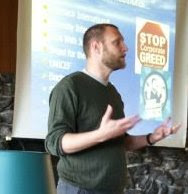The One Who Said Yes
However disturbing the fact that Jesus would intentionally neglect a dying friend, subjecting his family and friends to such grief, what I find worse is that Jesus does it as an opportunity for the glorification of God. (Couldn't God find better ways for glorification? Better ways to teach Jesus' followers? Better ways to inspire hope and assurance?) I can only assume that whatever Jesus was doing where he was, was so important that he could not leave until it was done. (Neither the place or Jesus' activities there ever receive mention in John's Gospel, however, so I question that idea, too.)
For me, right now, the real hero of the story at this point is Thomas Didymus ("the twin"), who speaks the words quoted above.
Jesus is heading back to Judea, where (in John's Gospel, at least) Jesus repeatedly visits and is threatened with death each time (and still manages to win converts and disciples as loyal and loving as Lazarus and his sisters). In John's Gospel, Jesus returning the Judea is the equivalent of walking into hostile, enemy territory. This is foolish behavior - obviously there is work to be done and disiples to make aplenty in the Galilee and even the Decapolis (the Hellenic cities on the far side of the Jordan). Jesus and his disciples receive a warmer welcome in Samaria than in Judea! But Judea is where Jesus is going - and apparently the disciples have a choice whether or not to follow him.
Of course, they always have a choice. They are not servants bound to a master. They are not slaves. At every moment of every day, they must choose whether or not to continue alongside Jesus. It is just like marriage or baptism - you can't rely on that first experience to see you through all the experiences to come, you must choose over and over again to be married, or a disciple. We all get to choose. Have to choose.
But to be a disciple, you often choose death in the service and footsteps of Jesus.
Here, Jesus ups and starts walking away, heading for Judea - and unspeakable resistance. His disciples, sitting around the fire, are stunned and unsure, questioning and reconsidering. And Thomas speaks up - "let us go with him, that we may die with him."
Thomas is the one who sees the reality - that following Jesus means walking in the shadow of death, of resisting powers and defying conventions in order to minister to those most needy. And that those in power and those whose fortunes are bound up by the conventions of culture and economy and might will bring all of their power, wealth and violence to stop you from upsetting things. And that what it means to be a disciple is just that: to suffer and die in upsetting things for the rich and powerful and proud.
Thomas says: I'm in. I signed on to this man's vision, and I believe in it. The world can be different, can be better, and if we have to go to the heart of the beast in order to start changing it, then I''m following Jesus there.
But here's the key to the story: Those that followed Jesus into the jaws of death were the ones to witness a miracle. Grief would be healed, the dead would rise, answers and faith would be found. Only those willing to risk persecution and death for the Kingdom of God witnessed the miracle. Only those willing to die with Jesus (rather than live without him) glimpsed the Kingdom.
Are we given no less a choice? Are the stakes lower for us than for Thomas? Are the Powers and Principalities of this world more congenial to Jesus' vision and the Kingdom of God?
Can we say, with Thomas, "Let us also go, that we may die with him"? Will we say, "Let us also go..."? Despite the trials and resistance? Are we willing to consider the values of the Kingdom of God more trustworthy than the values of our Culture, Economy, Government, Pocketbook?
Defying all logic and convention, Jesus went to Judea to raise someone from the dead. Are we willing to follow him into dangerous territory to witness a miracle?


